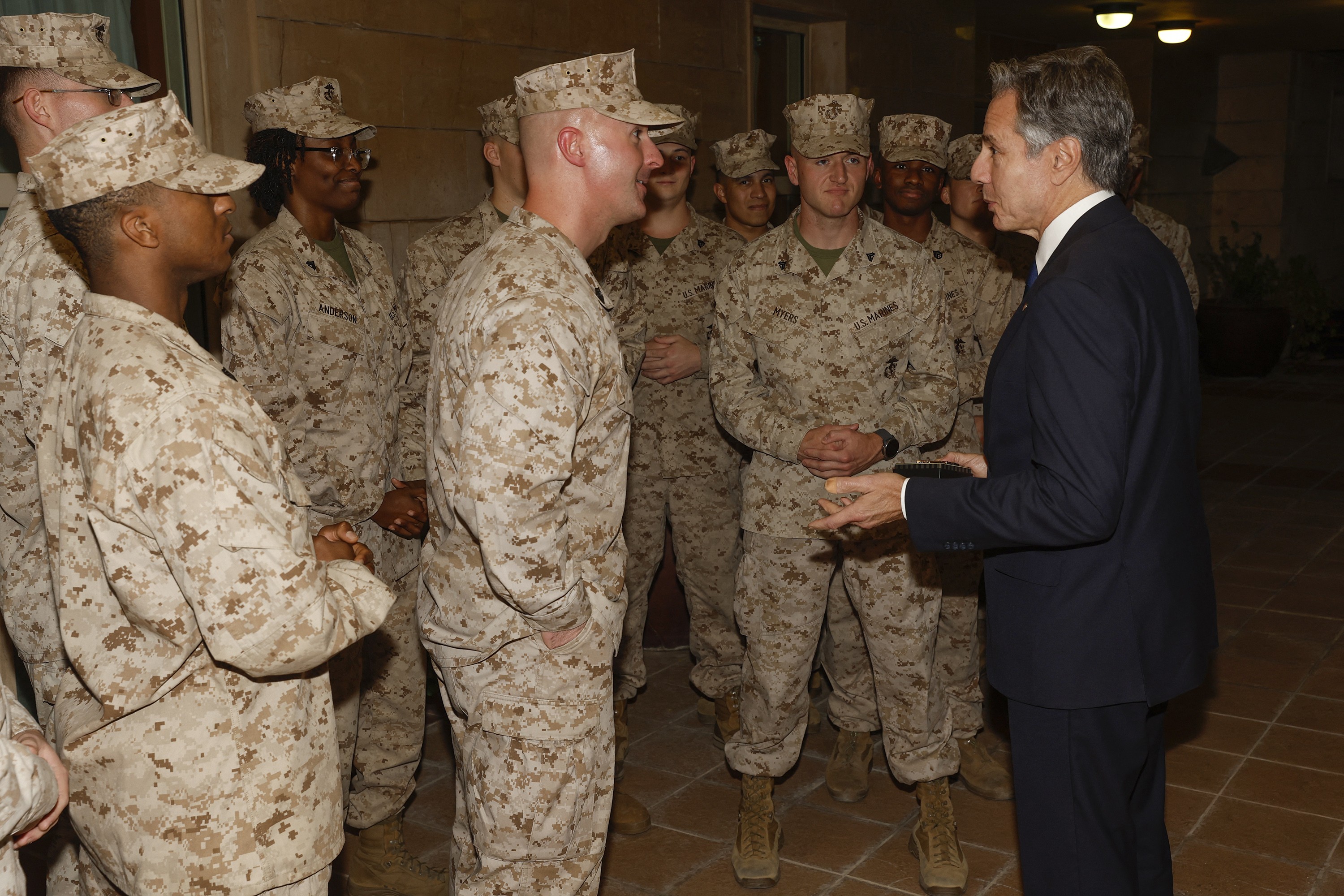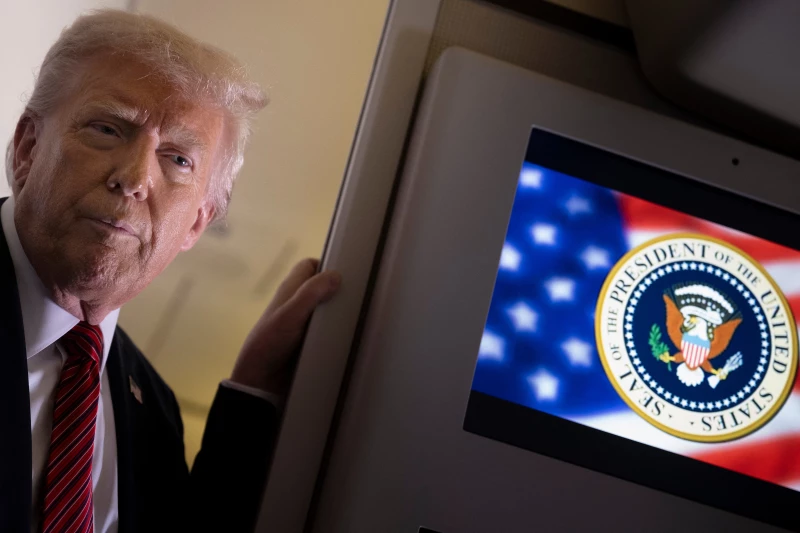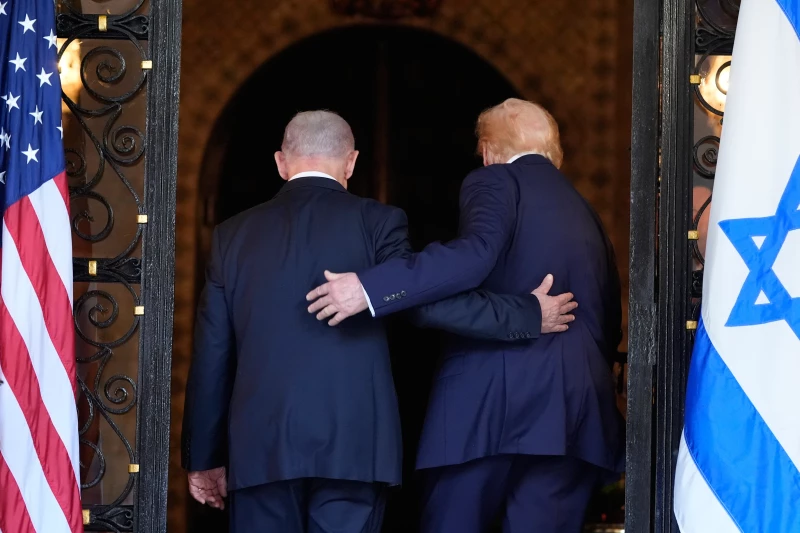Since the onset of the Israel-Hamas War on Oct. 7, bases hosting US troops in Iraq and Syria have come under a series of fresh attacks from Iran-backed proxy militias. At the same time, the US troop presence in Iraq is facing renewed pressure from the powerful political wings of these militias in Iraq, who are once again demanding their expulsion.
Since Oct. 17, renewed drone attacks and rocket fire have targeted bases hosting US troops at least 52 times, 24 times in Iraq and 28 times in Syria, injuring 56 US personnel.
“The current crisis in Gaza is a significant challenge to the US presence in Iraq because Iran-backed militias are prepared to increase attacks against American forces in the country at the same time that many Iraqi politicians are seeking to expel US diplomats,” Nicholas Heras, senior director of strategy and innovation at the New Lines Institute, told The New Region.
“Iran has worked hard over the past few years to be able to directly threaten US personnel in both Baghdad and Kurdistan Regional Government-controlled areas of Iraq,” he said.
The US has an estimated 2,500 troops in Iraq and 900 in Syria, all part of the Inherent Resolve operation against the Islamic State. The US combat mission in Iraq officially ended in December 2021. US troops remain in the country as part of the ongoing mission to “advise, assistant and enable” Iraqi forces fighting Islamic State remnants authorized by the Iraqi government. The smaller contingent in Syria is partnered with local Kurdish-led forces there fighting ISIS.
In Iraq’s federal regions, US troops are based at Baghdad International Airport and Ain Al-Asad Airbase in the western Anbar province. In the autonomous Kurdistan Region, the US has a troop base on the grounds of Erbil International Airport and troops in the Harir Airbase.
When these latest attacks began, Iraqi Prime Minister Mohammed Shia’ Al Sudani condemned them as “unacceptable” and ordered security forces to pursue the perpetrators. However, he has to walk a fine line given the firm opposition to this troop presence from hardline Iran-backed Shia political forces, which are again demanding he amend the Framework Agreement authorizing the continued presence of US and other coalition troops.
When then-US President Donald Trump made an unannounced visit to US troops in Ain Al-Asad Airbase in western Iraq in December 2018, Iraqi lawmakers saw it as an affront to the country’s sovereignty and called for expelling all US troops. Support for expelling US troops from Iraq only grew following the assassination of Iranian commander Qassem Soleimani and Iraqi militia leader Abu Mahdi al-Muhandis in a US drone strike in Baghdad in January 2020. Today, the unprecedented war in Gaza is fueling renewed opposition to US troops in the country.
However, this doesn’t mean the Iran-backed militias will attempt to drive these troops out by force or by compelling the government to order them to leave by withdrawing authorization for their presence.
“While the ongoing attacks by pro-Iran groups are to send a message that they stand with the Palestinians and are opposed to the US rather than being aimed at causing any real casualties, the Americans have taken wounded,” Joel Wing, author of the authoritative blog Musings on Iraq, told The New Region.
Almost half, 25, of the troops injured in these attacks have been diagnosed with traumatic brain injuries. The other 31 suffered relatively minor injuries, according to Pentagon officials.
The “near-daily attacks” US troops presently face in Iraq “are raising tensions,” Wing said.
It’s unclear under what circumstances the militias might seek to escalate or mount attacks that have higher chances of afflicting US casualties.
“If things get worse in Gaza, you could see attacks on the US embassy,” Wing said. “Even then, I’m not sure how much the Iraqi factions want to raise the stakes.”
Furthermore, it’s unlikely the Iraqi government will ultimately ask the US to pull all of its troops from the country, given the important role they continue to play in supporting the Iraqi armed forces.
“The Iraqi forces still rely upon the US for things like intelligence, and American contractors keep Iraqi planes and vehicles running,” Wing said. “They can’t operate without them. If the Americans go, the rest of the (anti-ISIS) coalition goes as well, which provides important training as well.”
It’s also questionable whether an order from the Iraqi government for US troops to withdraw from Baghdad would apply to the Kurdistan Region, where the Kurdistan Regional Government has been at odds with the federal government in Baghdad on many issues in recent years.
Wing summed up the “lines of authority” between the Baghdad and Erbil-based governments as “fuzzy and contradictory.”
“The Kurds could ask the Americans to stay if the US is told to leave by Baghdad, but that could lead to a huge political fight, which I don’t think the KRG is up for right now,” Wing said.
The KRG has also become more dependent, arguably than ever, on Baghdad for its monthly budget payments after Turkey shut the pipeline that hitherto exported Kurdish oil and provided the KRG with a major source of revenue.
“If that money is cut off, the KRG could go bankrupt, and it obviously can’t afford that,” Wing said.
Furthermore, Heras pointed out that the US would not want its presence in Iraq to be solely confined to the Kurdistan Region, even though it remains a secure and strategically important region.
“The US would not want to be limited to just a presence in the KRG because the balance of power in Iraq has shifted decisively toward Baghdad, and the US security engagement throughout Iraq depends on the agreement of the authorities in Baghdad,” Heras said.
“Iran is working hard to apply both political and military pressure on the United States in Iraq,” he added.
So far, the US has restricted retaliatory strikes against Iran-backed militias to Syria, likely to avoid complicating the situation on the ground in Iraq. The Biden administration similarly retaliated to a February 2021 strike against Erbil airport by striking at militia targets in Syria. So far, the three retaliatory strikes the US launched – Nov. 12, Nov. 8, and Oct. 26 – to date have all struck facilities and weapons storage facilities in Syria used by Iran’s powerful Islamic Revolutionary Guard Corps paramilitary and its militia allies in the region.
“If attacks get worse in Iraq, you could definitely see US strikes in that country as well,” Wing said. “I think Washington has warned Baghdad that if violence is stepped up, it will respond in Iraq.”
Washington hasn’t only been warning Baghdad about potential consequences. In late October, the White House confirmed Biden had sent a rare message directly addressed to Iranian Supreme Leader Ayatollah Ali Khamenei, warning him against targeting US troops in the Middle East.
“I think Washington has made it clear that if it takes serious casualties, it will retaliate in Iraq,” Wing said. “That has been the pattern in the past, and I don’t think that has changed.”
And even if the US does strike back at militia attacks inside Iraq, that doesn’t necessarily elevate the risk of a wider war substantially since the US has previously bombed weapons depots and other targets belonging to Iran-backed militias in Iraq.
Access to Iraqi bases has also helped the US military provide support for its troops in neighboring Syria. However, even if Washington somehow loses access to these bases, it could still support those Syria-based troops from elsewhere.
“Pulling out of Iraq would, of course, complicate the US presence in Syria, but there are always ways around it,” Wing said.
“The US has plenty of assets in the region to keep its forces supplied.”



 Facebook
Facebook
 LinkedIn
LinkedIn
 Telegram
Telegram
 X
X


